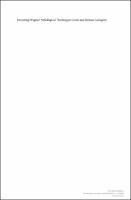Inventing Origins? Aetiological Thinking in Greek and Roman Antiquity
| dc.contributor.editor | Wessels, A.B. | |
| dc.contributor.editor | Klooster, J.J.H. | |
| dc.date.accessioned | 2022-08-02T11:28:38Z | |
| dc.date.available | 2022-08-02T11:28:38Z | |
| dc.date.issued | 2022 | |
| dc.identifier | OCN: 1287747245 | |
| dc.identifier.uri | https://library.oapen.org/handle/20.500.12657/57714 | |
| dc.description.abstract | Aetiologies seem to gratify the human desire to understand the origin of a phenomenon. However, as this book demonstrates, aetiologies do not exclusively explore origins. Rather, in inventing origin stories they authorise the present and try to shape the future. This book explores aetiology as a tool for thinking, and draws attention to the paradoxical structure of origin stories. Aetiologies reduce complex ambivalence and plurality to plainly causal and temporal relations, but at the same time, by casting an anchor into the past, they open doors to progress and innovation. | en_US |
| dc.language | English | en_US |
| dc.relation.ispartofseries | Euhormos: Greco-Roman Studies in Anchoring Innovation | en_US |
| dc.subject.classification | thema EDItEUR::N History and Archaeology::NH History | en_US |
| dc.subject.other | aetiological; Greek; Roman; Antiquity; etiologisch; Grieks; Romeins | en_US |
| dc.title | Inventing Origins? Aetiological Thinking in Greek and Roman Antiquity | en_US |
| dc.type | book | |
| oapen.identifier.doi | 10.1163/9789004500433 | en_US |
| oapen.relation.isPublishedBy | af16fd4b-42a1-46ed-82e8-c5e880252026 | en_US |
| oapen.relation.isFundedBy | da087c60-8432-4f58-b2dd-747fc1a60025 | en_US |
| oapen.relation.isbn | 9789004500143 | en_US |
| oapen.collection | Dutch Research Council (NWO) | en_US |
| oapen.series.number | 2 | en_US |
| oapen.pages | 228 | en_US |
| oapen.grant.number | 024.003.012 |

